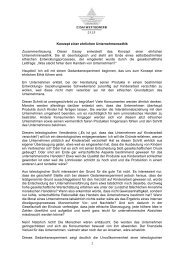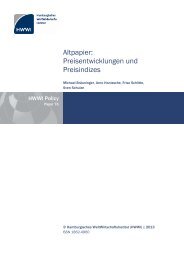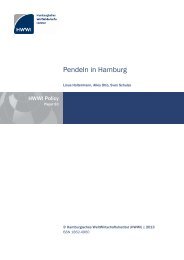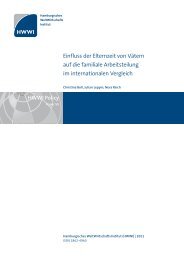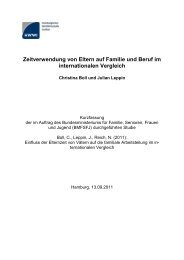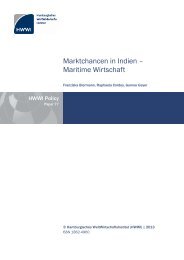Evaluation in der deutschen Entwicklungszusammenarbeit - HWWI
Evaluation in der deutschen Entwicklungszusammenarbeit - HWWI
Evaluation in der deutschen Entwicklungszusammenarbeit - HWWI
Sie wollen auch ein ePaper? Erhöhen Sie die Reichweite Ihrer Titel.
YUMPU macht aus Druck-PDFs automatisch weboptimierte ePaper, die Google liebt.
Anhänge 193<br />
evaluation process. The organisational aspects must address three requirements: develop<strong>in</strong>g<br />
a policy and a set of guidel<strong>in</strong>es for evaluation; ensur<strong>in</strong>g impartiality and <strong>in</strong>dependence;<br />
l<strong>in</strong>k<strong>in</strong>g evaluation f<strong>in</strong>d<strong>in</strong>gs to future activities.<br />
466. Often, certa<strong>in</strong> types of organization will tend to strengthen one of the above<br />
requirements at the expense of others; e.g., ensur<strong>in</strong>g the <strong>in</strong>dependence of the process may<br />
weaken the potential for provid<strong>in</strong>g a strong l<strong>in</strong>kage between the evaluation f<strong>in</strong>d<strong>in</strong>gs and<br />
decision-mak<strong>in</strong>g. An optimal solution should be sought to balance all of these requirements.<br />
467. Impartiality and <strong>in</strong>dependence will best be achieved by separat<strong>in</strong>g the evaluation<br />
function from the l<strong>in</strong>e management responsible for plann<strong>in</strong>g and manag<strong>in</strong>g development<br />
assistance. This could be accomplished by hav<strong>in</strong>g a central unit responsible for evaluation<br />
report<strong>in</strong>g directly to the m<strong>in</strong>ister or the agency head responsible for development assistance,<br />
or to a board of directors or governors of the <strong>in</strong>stitution. To the extent that some evaluation<br />
functions are attached to l<strong>in</strong>e management they should report to a central unit or to a<br />
sufficiently high level of the management structure or to a management committee<br />
responsible for programme decisions. In this case, every effort should be made to avoid<br />
compromis<strong>in</strong>g the evaluation process and its results. Whatever approach is chosen, the<br />
organisational arrangements and procedures should facilitate the l<strong>in</strong>k<strong>in</strong>g of evaluation<br />
f<strong>in</strong>d<strong>in</strong>gs to programm<strong>in</strong>g and policy mak<strong>in</strong>g.<br />
468. Aid agencies need a policy on evaluation which should address the above issues as<br />
well as the openness of the evaluation process, <strong>in</strong>clud<strong>in</strong>g the dissem<strong>in</strong>ation of results.<br />
IV. Credibility<br />
469. The credibility of evaluation depends on the expertise and <strong>in</strong>dependence of the<br />
evaluators and the degree of transparency of the evaluation process. Credibility requires that<br />
evaluation should report successes as well as failures. Recipient countries should, as a rule,<br />
fully participate <strong>in</strong> evaluation <strong>in</strong> or<strong>der</strong> to promote credibility and commitment.<br />
470. Aid agencies need a critical mass of professional evaluation staff <strong>in</strong> or<strong>der</strong> to have<br />
sufficient expertise <strong>in</strong> their various fields of activity and to ensure credibility of the process.<br />
471. Transparency of the evaluation process is crucial to its credibility and legitimacy. To<br />
ensure transparency:<br />
- The evaluation process as a whole should be as open as possible with results made<br />
widely available.<br />
- <strong>Evaluation</strong> reports must dist<strong>in</strong>guish between f<strong>in</strong>d<strong>in</strong>gs and recommendations. Relevant<br />
<strong>in</strong>formation to support f<strong>in</strong>d<strong>in</strong>gs should be <strong>in</strong>cluded <strong>in</strong> a way that does not compromise<br />
sources.<br />
V. Usefulness<br />
472. To have an impact on decision mak<strong>in</strong>g, evaluation f<strong>in</strong>d<strong>in</strong>gs must be perceived as<br />
relevant and useful and be presented <strong>in</strong> a clear and concise way. They should fully reflect<br />
the different <strong>in</strong>terests and needs of the many parties <strong>in</strong>volved <strong>in</strong> development co-operation.<br />
Easy accessibility is also crucial for usefulness. The evaluation process itself promotes a<br />
further clarification of objectives, improves communication, <strong>in</strong>creases learn<strong>in</strong>g, and lays the<br />
groundwork for follow-up action.




